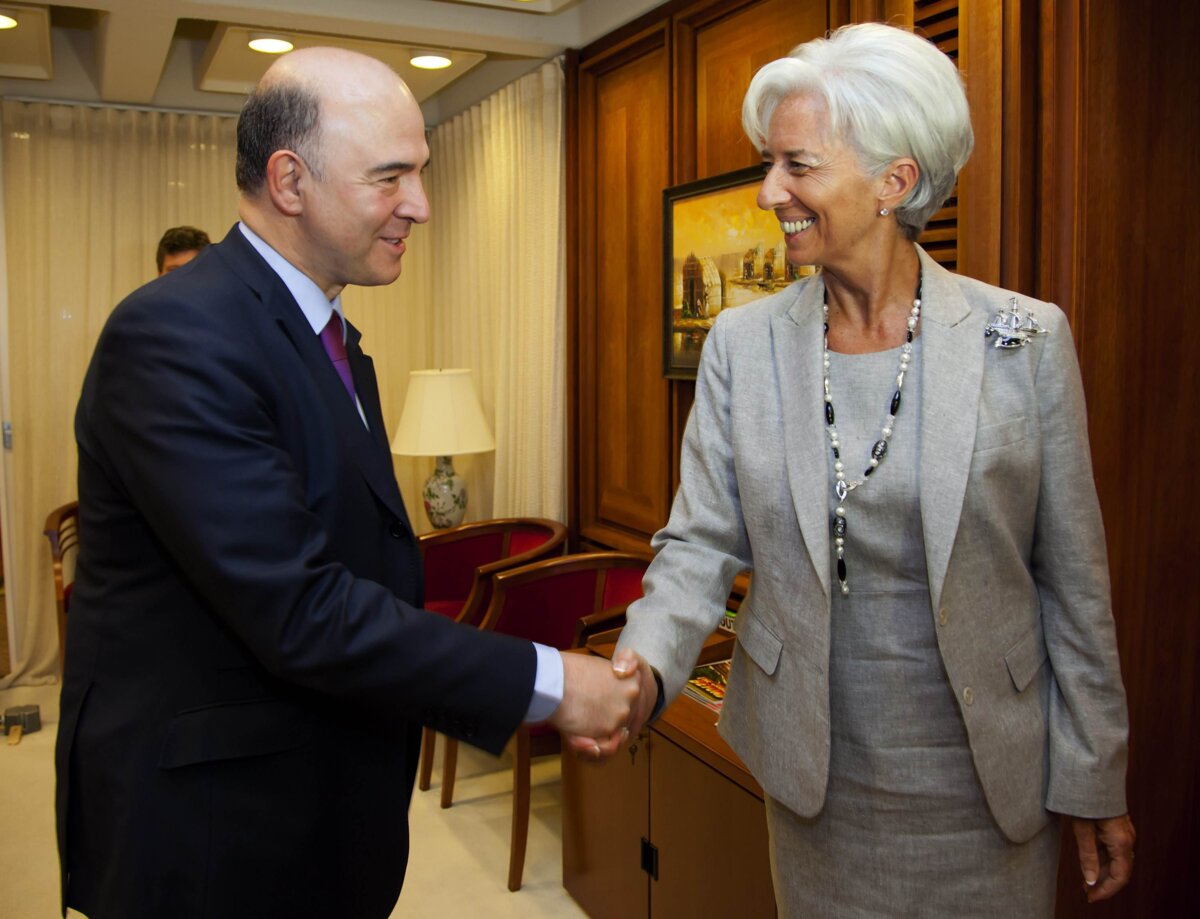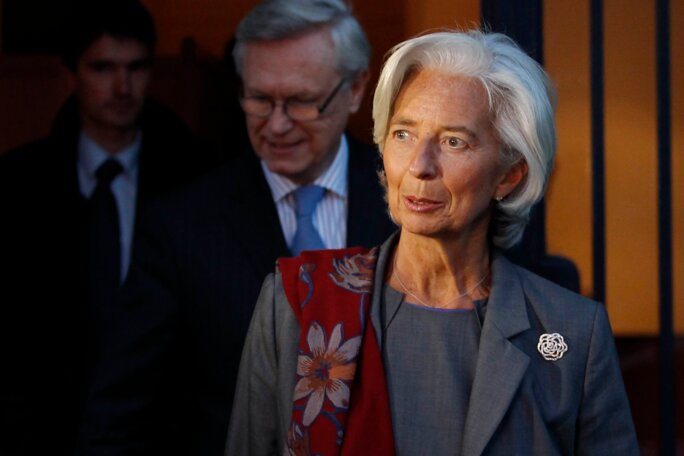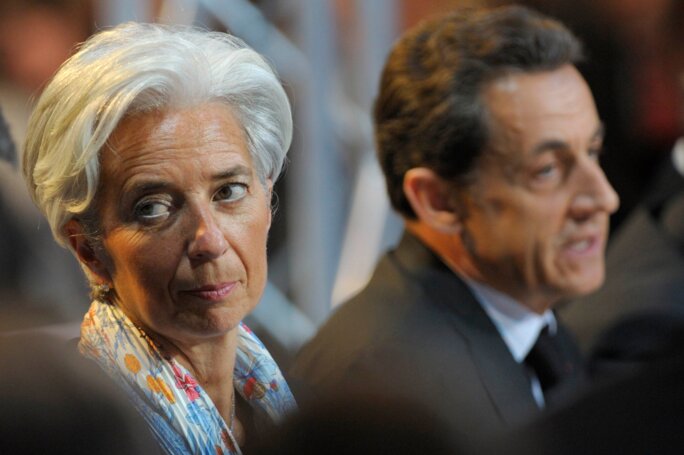Following a decision by French magistrates on Friday to designate International Monetary Fund (IMF) chief Christine Lagarde as an ‘assisted witness’ in their investigation into the conditions of a payout, when she was French finance minister, of more than 400 million euros to controversial tycoon Bernard Tapie, Mediapart has learnt from several well-placed sources the reasons why the judges backed off from placing her under formal investigation, as had been widely speculated.
Lagarde, 57, was questioned for two days, beginning early Thursday morning, by three magistrates from France’s Court of Justice of the Republic, the CJR, which is responsible for investigating suspected wrongdoing by ministers. Mediapart understands that two of the three judges believed the evidence that Lagarde had acted improperly in the process that led to the payout for Tapie warranted placing her under investigation - a move that is one step short of charges being brought - for 'aiding and abetting falsification' and of 'misappropriation of public funds'.
But, according to sources close to the case, among the considerations that swayed the two magistrates was an unusual statement in support of Lagarde by current French finance minister Pierre Moscovici, made just 24 hours before her interrogation began, and a reported change in her previous accounts that the French presidential offices, under Nicolas Sarkozy, asserted no pressure upon her actions regarding Tapie.

Enlargement : Illustration 1

The CJR is investigating alleged irregularities in an arbitration procedure that in 2008 awarded Bernard Tapie, a businessman and former politician who was a high-profile supporter of Sarkozy’s 2007 presidential election campaign, 403 million euros in compensation from the public purse. That award, paid out of public funds, ended a longstanding legal battle until then played out in courts of law and it was Lagarde’s approval that the case should be removed from the legal system and placed in an arbitration process that led to the huge payout.
There is no suggestion that Lagarde benefited personally from any decision she made, and she denies any wrongdoing.
The compensation case centred on Tapie's alleged spoliation by the former state-owned bank Crédit Lyonnais during its mandated sell-off of his business interests, notably his controlling share of the Adidas sportswear and accessory company, in the early 1990s.
Tapie's claim for damages was brought against the Consortium de Réalisation (CDR), the French government entity responsible for the liabilities of the defunct bank which collapsed following a high-risk lending scandal in 1993.
One of the key questions is why Lagarde pursued the decision of her predecessor, Jean-Louis Borloo, a close friend of Tapie for whom he once served as a lawyer, to opt for the private arbitration procedure that was highly favourable for Tapie. The decision to drop the legal fight and enter into arbitration was taken immediately after Nicolas Sarkozy's election as president in May 2007, when Borloo was appointed, for a one-month period, finance minister. Lagarde succeeded him in June 2007 and remained in the post until she was appointed as Managing Director of the IMF in June 2011.
Government lends Lagarde unconditional support
While the decision by the three CJR magistrates late on Friday to make Lagarde an ‘assisted witness’ is undoubtedly a relief for the IMF chief, it does not in itself mean that she is no longer suspected of wrongdoing. The status, peculiar to French law, implies that there is evidence suggesting the implication of the ‘assisted witness’ in a suspected crime, but that there is not what the French code of law defines as “serious or corroborating” evidence of involvement in a crime, criteria which are necessary for a suspect to be formally placed under investigation.
The magistrates’ decision therefore maintains Lagarde as a key witness to the case, and if “serious or corroborating” evidence against her is uncovered as the investigation unfolds she would then again face being placed under investigation. A separate, parallel judicial investigation into the affairs of Bernard Tapie, also led by three magistrates, is ongoing, and any results that are found to be relevant to the CJR’s probe will be passed on to it.
The panel of three CJR magistrates is composed of the president of the court’s investigative commission, Michel Arnould, and Judges Didier Guérin and Dominique Guirimand. They are partly chosen on the basis of having no publicly pronounced political affiliations, and their decisions, such as that of designating Lagarde an ‘assisted witness’, are taken with common agreement.

Enlargement : Illustration 2

Sources close to the case have told Mediapart that Michel Arnould was, before Lagarde’s interrogation began, in favour of making her an assisted witness, according to his appreciation of the case file thus far and, naturally, pending the nature of her statements during questioning. The other two magistrates, according to the sources, believed that there was already serious or corroborating evidence to justify placing her under formal investigation.
But on Wednesday May 22nd, the day before Lagarde was questioned, French finance minister Pierre Moscovici, in an interview published in Le Monde, announced the government’s continued support of her whatever the outcome of her interrogation. “Madame Lagarde continues to enjoy the full confidence of the French authorities [in her position] as head of the IMF,” Moscovici said. “I will repeat it if necessary, either myself or via the intermediary of France’s representative on the IMF board.”
While the minister’s comments caused a political stir because of their implication that France was prepared to ignore the ethical code of the IMF as set out in Lagarde's contract with the fund, they also, according to Mediapart’s sources, had a significant influence in swaying the CJR magistrates. Notably, Michel Arnould reportedly impressed upon his colleagues that the statement was a clear warning, sanctioned at the highest level, against taking a decision that could destabilise the IMF.
Lagarde 'changes line of defence'
According to one well-informed source, the other major factor that led to the magistrates reaching a unanimous decision to make Lagarde an ‘assisted witness’ was a change in the tack of her line of defence. Mediapart was unable to gain confirmation of this from other sources it contacted, one of them even dismissing the suggestion as being “unfounded information”.
Until now, Lagarde has maintained that she had never received instructions regarding her management of the Tapie arbitration procedure, and that her decisions were taken entirely independently. However, one well-informed source contacted by Mediapart claimed that under questioning last week, Lagarde underlined to the magistrates that the decision to launch the arbitration procedure so favourable for Tapie was first made by her immediate predecessor as finance minister, Jean-Louis Borloo, a former lawyer for Tapie, who made the move as of his first day in office in May 2007. But she also, according to the source, said that the president’s office was involved in taking decisions on the case, notably via the services of Sarkozy’s chief-of-staff, Claude Guéant.

Enlargement : Illustration 3

Importantly, this would alleviate Lagarde’s responsibility in taking a deliberate irregular decision or decisions in the arbitration procedure, proof of which is required before she could be placed under investigation for 'aiding and abetting falsification' and of 'misappropriation of public funds'.
Her lawyer, Yves Repiquet, interviewed on TV rolling news channel BFM-TV on Friday evening, was asked whether his client would today have acted in the same way that she did in 2007-2008. “Given the elements she had in hand at the time, yes,” he replied, but added that, in the light of what she now knows, “not necessarily today”.
According to a person close to Lagarde, she was irritated by a recent public statement given by Guéant in which he insisted that he had played no role in the Tapie affair and that all the decisions were taken by the finance ministry.
-------------------------
See below for more of Mediapart's investigations and reports on the Christine Lagarde-Bernard Tapie case:
IMF boss Christine Lagarde to appear before French judges
French court to investigate IMF chief Lagarde over 'misappropriation of public funds'
French prosecutor finds evidence that Lagarde 'obstructed law' in Tapie case
Conflict of interest' delays Lagarde probe decision
Exclusive: the secret report that could scupper Lagarde's bid to lead IMF
The sting in the tail of Tapie and the Crédit Lyonnais payout
Two tycoons and a secret pact to calve up millions in compensation
The Chicago gang behind Lagarde's appointment as IMF chief
-------------------------
English version by Graham Tearse


